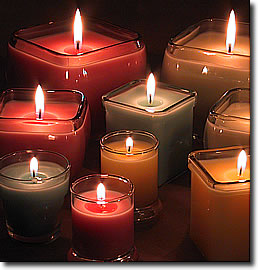There’s something about a crisp fall day that inspires some to light a candle and fill the room with scents of pumpkin spice, apple cider and evergreen.
While a pleasant sensory experience, some may soon find themselves sneezing.
It would be nice to think a pumpkin pie was melted and shaped into a pillar of wax that leaves you with a warm, happy feeling once lit. But the truth is many scented candles are filled with chemicals and metals that create the good smells.
Medical practitioners are identifying more patients who have fragrance allergies or sensitivities that lead to discomfort.
“Being near a burning, scented candle can cause allergic reactions such as sneezing, runny nose, watery eyes and even headaches,” said Ed Neuzil, ARNP, PhD and owner of the Allergy, Sinus and Asthma Family Health Center in Lady Lake, Florida. “In extreme cases, some people exhibit breathing difficulties and wheezing. Additionally, some people are sensitive to the soot released from the flame.”
Experts suspect that fragrance allergies are becoming more prominent because fragrances are more prevalent in products such as shampoos, lotions, cleaning supplies and cosmetics. They recommend the following tips to minimize candle soot pollution:
- Because many scented and slow burning candles may contain metals, consumers should look to see if the core of the wick is shiny metal. If you see metal, do not burn, or check with the manufacturer.
- When you do burn candles, keep the wicks cut short to one-quarter of an inch. A longer wick causes a larger flame and thus more soot.
- Do not shake or tip candles because the candle can smoke and send soot into the air to land on walls, carpets and furniture.
- Keep candles in places away from children and pets. Besides fire hazard, small children and animals may accidentally disturb a candle, causing it to smoke and release soot.
- Refrain from burning scented or slow-burning candles that have additives. Look for candles, such as beeswax, that do not contain high levels of pollutants.

Posted by ladymarielle on January 19, 2014 at 8:52 pm
Great post! thanks for sharing!
Posted by Me and VOCs | Clear Path Writer on April 3, 2015 at 6:42 pm
[…] Here is a writing specific to Candle allergies. […]
Posted by Michael on June 27, 2015 at 9:19 pm
My wife lit a scented candle in our bedroom . I woke up coughing , tight chest and tons of mucous from the candle . I took 2 antihistamines , removed the candle, opened windows and it took about an hour before I could breath enough to go back to sleep . Really actually very dangerous to burn scented candles in a closed room .
Posted by irrigatorrelief on June 29, 2015 at 2:44 pm
That is so frightening, Michael! It’s proof that you really need to be careful about these household items that seem innocuous. Have you had experience with the air fresheners that you plug into the wall? We’d love to know…
Posted by jackie on March 1, 2016 at 5:40 pm
has anyone had eye problems with there scented candles
Posted by irrigatorrelief on March 1, 2016 at 5:51 pm
A lot of time we aren’t allergic to the candles but hypersensitive to their scent. But the answer is absolutely. Any odor can potentially trigger a variety of symptoms for eye irritation to the nose and lungs as well.
Posted by skinplusng on September 4, 2016 at 10:17 pm
I had to Google this because it just happened to me. What on earth. Thank God I have my own candle supplies coming soon and I didn’t purchase too many of these scented things. I usually use unscented tea candkes with an oil burner for essential oils and I’ve never felt this itchy in my throat. Worse off I didn’t get any good smells from it. Scented candles are a bunch of wannabes. I’m out.
Posted by irrigatorrelief on September 6, 2016 at 1:48 pm
Glad we could help. It’s amazing the different things we can be allergic to..
Posted by JP on September 28, 2016 at 1:09 am
Never used to be allergic if that is what we are calling it, I have read that all candles as well as wood burners or wood burning fireplaces give out toxic gases and chemicals and and can be very bad for you especially the elderly and the young children. Just becasue they do not complain does not mean they are not being affected. these toxins are bad for the lungs. I never was bothered all my life with fireplaces when being around them but when we bought a home with one, I started to get scratchy throats, burning sinus and some wheezing at times. My neice’s little boy starts coughing as soon as they would light their fireplace ( wood) they found out he had Asthma and that this could have been a contributor if not, it can aggravate the condition… Keep track when you have candles on or the fireplace if at all sensitive….
Posted by Karen Bright on December 26, 2016 at 12:06 pm
nightmare, i have had xmas candles burning for two days, lovely xmas smell all over the lounge until 8pm last night when i was itching all over and by itching i mean i had red welts everywhere from scratching…. took hours to calm down then my husband said the candles were killing him as his chest had gone really tight and he couldnt breath properly. He had blown the candles out by then as he had made the connection. No more xmas candles for us
Posted by irrigatorrelief on December 27, 2016 at 2:56 pm
That’s frightening Karen. You should make sure you let friends and family know about this in case you celebrate elsewhere where candles are lit. Glad you figured it out! Happy Holidays!